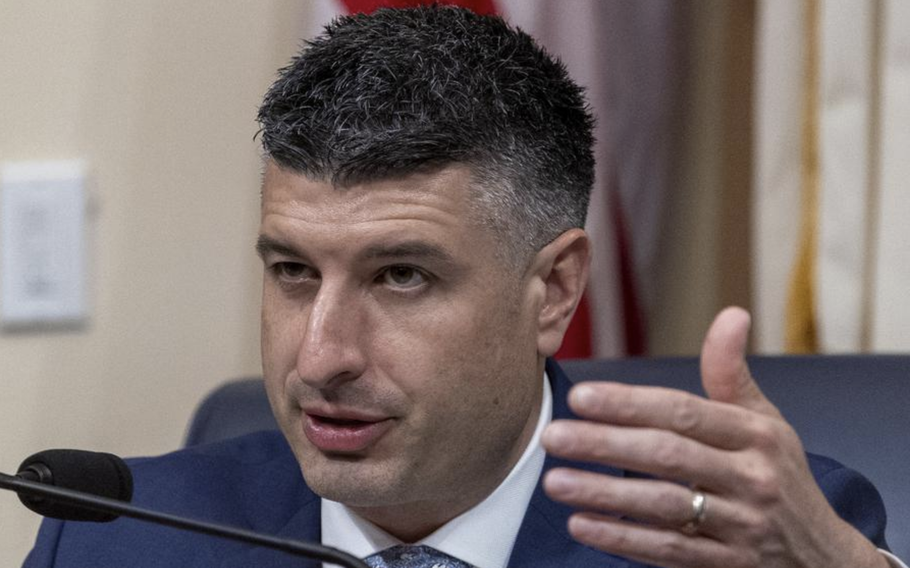
“I know firsthand how veterans feel when VA is out of reach. We do not have a VA hospital in my district,” said Republican Rep. Tom Barrett, who lives with his family in rural Michigan after serving in the Army for 22 years. Barrett, who is chairman of the House Veterans’ Affairs Committee’s subpanel on technology modernization, is pictured here speaking during a hearing on May 19, 2025. (Eric Kayne/Stars and Stripes)
WASHINGTON — Long drive times, sparse internet access and a shortage of doctors pose challenges for veterans in rural and remote areas trying to get health care and other services through the Department of Veterans Affairs.
Veterans, local government agencies and advocacy groups gathering at the Chez Veterans Center in Urbana, Ill., on Friday delivered that message to lawmakers who traveled from the nation’s capital for a “field hearing” on addressing veterans’ access problems to rural health care.
The two-hour hearing of the House Veterans’ Affairs Committee’s subpanel on technology modernization identified ways to improve the delivery of health care services to rural veterans that include expanding broadband internet, increasing online doctors’ visits and making certain that veterans in remote areas know they’re eligible for VA services and benefits.
Though about 33% of veterans who use VA health care live in rural areas, they “drive longer distances, wait longer for appointments and have fewer providers to choose from,” said Rep. Tom Barrett, R-Mich., an Army veteran and the subpanel chairman. “I know firsthand how veterans feel when VA is out of reach. We do not have a VA hospital in my district. Veterans in rural communities face serious barriers.”
Barrett, who lives with his family in rural Michigan after serving in the military for 22 years, emphasized the growing role of technology in delivering VA care to rural veterans “because VA simply cannot give veterans all the care and services they need at traditional brick-and-mortar facilities.”
But Rep. Nikki Budzinski of Illinois, the top Democrat on the committee, said it is critical for technology to be better integrated into “the rural experience” for veterans to have online appointments more easily for some health services.
She pointed to a national shortage of doctors and nurses that is more severe outside of major metropolitan areas.
“Rural health care is dying. One-third of all rural hospitals are at risk of closing in the near future. We cannot have a conversation about community care without discussing this,” Budzinski said.
The VA is seeing growth in online health programs that include medication management, mental health counseling and crisis intervention services, said Daniel Zomchek, director of Veteran Integrated Service Network 12 at the VA.
The regional network is comprised of VA hospitals and clinics in Michigan’s upper peninsula, northwest Indiana and Wisconsin, and serves a large rural population, he said.
But many veterans are not fully aware of their eligibility for VA health services and rely on their local hospitals for care, many of which are struggling, said Christina Schauer, an Army veteran and registered nurse.
Nearly half of the nation’s rural hospitals operated at a financial loss in 2023, said Schauer, president of Tri-State Women Warriors, which helps female veterans in Iowa, Illinois and Wisconsin access VA care and benefits.
Geographic isolation and limited broadband make communication and outreach difficult with veterans in rural areas, she said. Her agency sends coordinators to farmers markets to talk with veterans and their families about eligibility for VA care and benefits.
Hillary Rains, community engagement manager with the Illinois Department of Commerce and Economic Opportunity, said there is a lack of infrastructure to connect many rural veterans to the internet.
She said a presidential executive order in May ended $2.75 billion in funding to increase broadband services to rural communities.
“When we talk about the digital divide in 2025, we are talking about a disparity in access to fast, affordable and robust internet, as well as to the devices, tools and skills that allow people to connect to critical supports throughout their lives,” Rains said.
“Expanding access to broadband and telehealth resources is key to the health and well-being of rural veterans, not only in Illinois but across the nation,” she said.
John Lawson, superintendent of the Veterans Assistance Commission of St. Clair County in Illinois, said his commission supports the Rural Veterans Transportation to Care Act that would increase ride options for veterans traveling to doctor appointments.
The legislation would expand the VA’s highly rural transportation grant program that is only available to counties with fewer than seven people per square mile.
Lawson said public transportation and drive-share options offered in metropolitan areas are largely unavailable in many rural and remote communities.
“We’re here today, far from the halls of Congress, because our oversight responsibilities don’t stop in Washington, D.C.,” Barrett said. “It is important for Congress to continue that work in the communities where our veterans live, where care is delivered, and where the real impact of VA systems and decisions is felt every day.”